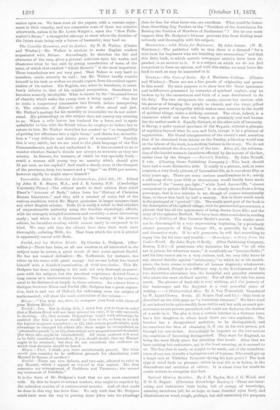NOVELS. —The Cure of Souls. By J. Maclaren Cobban. (Chatto and
Windus.)—There are not a few proofs of originality and power
in this novel. Its main purpose is to show how the dense ignorance and indifference generated by centuries of spiritual neglect, may be broken up by the earnestness end faith of a man determined to do his duty. The two clergymen, the curate, sincere but narrow, with his panacea of bringing the people to church, and the vicar, gifted with that power of sympathy which makes men masters in the world
of spiritual things, make a striking contrast. The vicar, indeed, is a character which one does not forget, so genuinely real and human has the author made it. Equally distinct, at the other pole of humanity is Bacup, a quite typical specimen of the sPexteds, without a glimpse of anything beyond what he sees and feels, except it be a glimmer of superstition. His literal interpretation of the curate's rash assertion that if he abstained from labour on the Sunday, a blessing would rest on the labour of the week, is a striking feature in the story. We do not quite understand the denouement of the tale. After all, the reforma- tion of the hamlet seems to havebeen effected by the terrors of the law, rather than by the Gospel.---Nature's Nobility. By John Sewall. 3 vols. (Charing Cross Publishing Company.)—This book should have had a more distinctive title. It really is a picture, and, in some respects, a very lively picture, of Lanoashire life, as it was about fifty or sixty years ago. There are some curious anachronisms in it; surely a mill-song of the year 1818 or thereabouts would hardly have made mention of the "merry gaslight;" while Lord Arrowcliffe, "almost omnipotent in private-Bill business," is so clearly drawn from a living personage, that it is a mistake in art, though of course intentionally done, to throw him back by half a century. Nor is there much merit in the portrayal of "genteel " life. The really good part of the book is the description of the upland village, with its patriarchal government, a picture that has all the appearance of being drawn from life; and the story of the agitator, Barford. We have been often reminded in reading Nature's Nobility of Mrs. Linnosus Banks's novels. The reader must not be discouraged by a very unpromising beginning, by a peculiarly absurd panegyric of King George III., or generally by a feeble and discursive style. If ho will persevere, he will find something to repay him for his time and trouble.--Monedyne : a Story from the Under.World. By John Boyle O'Reilly. (Pilot Publishing Company, Boston, U.S.)—A gentleman who dedicates his book "to all who are in prison, for whatever cause," is manifestly an " irreconcilable ;" and his bias comes out in a very curious, and, we may take leave to say, absurd diatribe against " aristocracy," to which he or his mouth- piece, the hero, seems to attribute all human depravity whatsoever. Equally absurd, though iu a different way, is the development of the two Australian aborigines into the beautiful and graceful creatures who adorn the most civilised society. For all this, the tale has some merit. Tho picture of bush-life is very striking, anal the journey of the bushranger and the Scrjoant is a very powerful piece of writing. —A Dietinguiehed, Man. By A. Von Winterfeld. Translated by W. Laird-Clowes. 3 vole. (C. Kogan Paul and Co.)—This book is described on the title-page as "a humorous romance." Wo have read it, not indeed to be quite candid, from end to end, but with as much per- severance as our powers permitted, and could not find even the shadow of a smile in it. The plot is that a certain butcher in a German town has a fair daughter, to whose baud there are two aspirants. The butcher has a disappointed ambition, to be distinguished, and ho conceives the idea of obtaining it, if not in his own person, yet through his son-in:law. Accordingly he imposes on the two suitors the condition of becoming distinguished. They start for England, as being the most likely place for attaining that result. After that we have nothing but caricature, not in the least amusing, as it seemed to us. The fun that is made, or sought to be made, out of tho misadven- tures of any one, is really a barbarous sort of humour. Who could get up a laugh now at Tittlebat Titmouse dyeing his hair green P The best type of mind finds no pleasure, either in real life or in fiction, in the discomforts and mistakes of others. It is about time for would-be comic writers to recognise this fact.
































 Previous page
Previous page